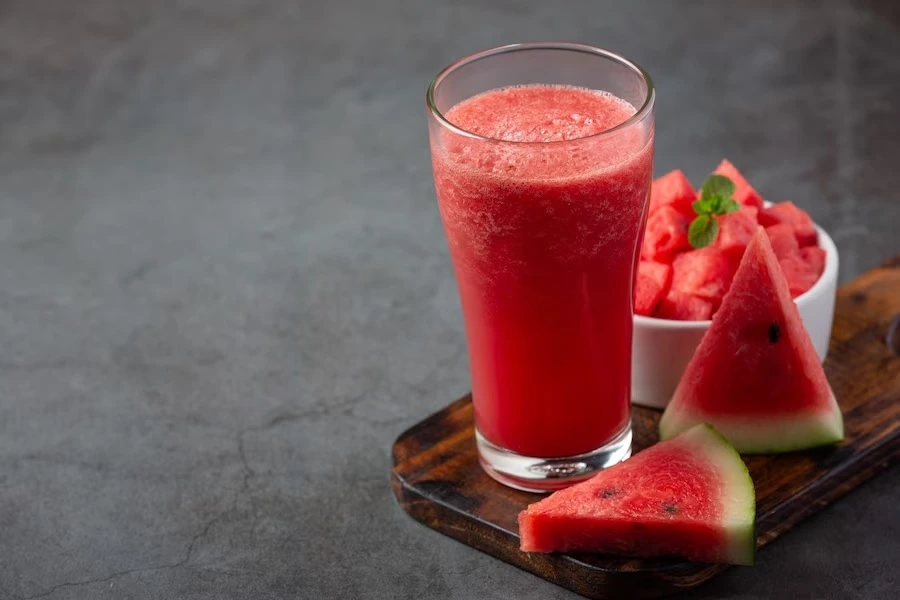
Benefits of Watermelon: The Ultimate Guide to This Refreshing Summer Fruit
Watermelon is a delicious and refreshing fruit that is enjoyed by many around the world. Not only is it juicy and flavorful, but it is also packed with nutrients that provide numerous health benefits. In this article, we will explore What are the Benefits of Watermelon and why you should add it to your diet.
Table of Contents
- What is Watermelon?
- Nutritional Content of Watermelon
- Hydration Benefits of Watermelon
- Anti-Inflammatory Properties of Watermelon
- Cardiovascular Benefits of Watermelon
- Skin Benefits of Watermelon
- Digestive Benefits of Watermelon
- Weight Loss Benefits of Watermelon
- Other Health Benefits of Watermelon
- How to Select and Store Watermelon
- How to Incorporate Watermelon into Your Diet
- Watermelon Recipes to Try
- Potential Risks of Consuming Watermelon
- Conclusion
- FAQs
What are the Benefits of Watermelon?

1. What is Watermelon?
Watermelon is a tropical fruit that is part of the Cucurbitaceae family, which also includes cucumbers and pumpkins. It is typically large and oval-shaped, with a green rind and a juicy red flesh that is sweet and refreshing. Watermelon is a summer fruit that is typically consumed in its raw form, but it can also be used in salads, smoothies, and other recipes.
2. Nutritional Content of Watermelon
Watermelon is a low-calorie fruit that is high in nutrients such as vitamins A and C, potassium, and magnesium. It is also a good source of lycopene, a powerful antioxidant that is known to protect against certain types of cancer. One cup of diced watermelon contains:
- 46 calories
- 11.5 grams of carbohydrates
- 0.6 grams of fiber
- 0.9 grams of protein
- 0.2 grams of fat
- 865 IU of vitamin A
- 12.5 mg of vitamin C
- 170 mg of potassium
- 14 mg of magnesium
3. Hydration Benefits of Watermelon
Watermelon is over 90% water, making it an excellent source of hydration. Consuming watermelon can help prevent dehydration and promote healthy fluid balance in the body. It is particularly beneficial for athletes or anyone who engages in strenuous physical activity, as it can help replace electrolytes lost through sweat.
4. Anti-Inflammatory Properties of Watermelon
Watermelon contains several anti-inflammatory compounds, including lycopene and vitamin C. These nutrients help to reduce inflammation in the body, which can lead to a lower risk of chronic diseases such as heart disease, diabetes, and certain types of cancer.
5. Cardiovascular Benefits of Watermelon
Watermelon has been shown to have several cardiovascular benefits, including reducing blood pressure and improving circulation. The high levels of citrulline found in watermelon are converted to arginine in the body, which can help to relax blood vessels and improve blood flow. This can help to reduce the risk of heart disease and stroke.
6. Skin Benefits of Watermelon
Watermelon is rich in vitamins A and C, both of which are essential for healthy skin. Vitamin A helps to promote the growth and repair of skin cells, while vitamin C helps to protect the skin from damage caused by UV rays and pollution. Watermelon also contains lycopene, which has been shown to protect the skin from sunburn.
7. Digestive Benefits of Watermelon
Watermelon is a good source of fiber, which can help to promote healthy digestion and regular bowel movements.
8. Weight Loss Benefits of Watermelon
Watermelon can be a great addition to a weight loss diet due to its low calorie and high water content. One cup of diced watermelon contains only 46 calories, making it a low-calorie snack that can help you feel full and satisfied. Additionally, the high water content in watermelon can help keep you hydrated and reduce feelings of hunger.
Watermelon also contains fiber, which can help slow down the digestion process and keep you feeling full for longer periods of time. This can prevent overeating and lead to a reduction in calorie intake, which is important for weight loss.
Furthermore, the citrulline found in watermelon can help to increase nitric oxide levels in the body, which can lead to an increase in metabolism and the burning of fat cells. This can further aid in weight loss efforts.
9. Other Health Benefits of Watermelon
In addition to the benefits already mentioned, watermelon has other health benefits as well. For example, it is rich in antioxidants such as lycopene, which can help protect against certain types of cancer and reduce the risk of heart disease. It also contains vitamins and minerals such as vitamin A, vitamin C, and potassium, which are important for overall health and well-being.
Watermelon has also been shown to have anti-inflammatory properties, which can help reduce inflammation in the body and prevent chronic diseases. Additionally, the high water content of watermelon can help to flush out toxins and waste products from the body, promoting healthy kidney function.
10. How to Select and Store Watermelon
When selecting a watermelon, look for one that is firm, symmetrical, and free of bruises or soft spots. It should also have a uniform shape and a smooth, green rind. You can also tap the watermelon to check for ripeness – a ripe watermelon should have a deep, hollow sound when tapped.
To store watermelon, keep it at room temperature until it is cut. Once it is cut, store it in the refrigerator in an airtight container for up to 3-4 days.
11. How to Incorporate Watermelon into Your Diet
There are many ways to incorporate watermelon into your diet. Here are a few ideas:
- Cut up watermelon and eat it as a snack
- Add watermelon to a fruit salad
- Blend watermelon into a smoothie
- Use watermelon as a topping for yogurt or oatmeal
- Grill watermelon and use it in a salad or as a side dish
12. Watermelon Recipes to Try
Here are a few delicious watermelon recipes to try:
- Watermelon Feta Salad
- Watermelon and Cucumber Gazpacho
- Watermelon Sorbet
- Watermelon Margarita
- Grilled Watermelon Salad with Arugula and Feta
13. Potential Risks of Consuming Watermelon
While watermelon is generally safe to consume, there are a few potential risks to be aware of. Some people may be allergic to watermelon, which can cause symptoms such as itching, swelling, and difficulty breathing. Additionally, consuming large amounts of watermelon can lead to an upset stomach or diarrhea due to its high water content.
Watermelon also contains fructose, a type of sugar that can be harmful in large amounts. However, the amount of fructose in watermelon is relatively low and is unlikely to cause harm unless consumed in very large quantities.
14. Conclusion
In conclusion, watermelon is a tasty and refreshing fruit that provides a variety of health benefits. From its high water content to its fiber and vitamin content, watermelon is a great addition to any diet. It can help with hydration, weight loss, and reducing the risk of chronic diseases. As long as it is consumed in moderation, watermelon is a safe and healthy fruit that can be enjoyed in a variety of ways. So next time you’re looking for a healthy and refreshing snack, reach for some juicy watermelon!
FAQs
1.Can watermelon help with weight loss?
Yes, watermelon can help with weight loss as it is low in calories, high in fiber, and has a high water content. These factors make it a filling and hydrating snack that can aid in weight loss efforts.
2.How much watermelon should I eat per day?
The recommended serving size for watermelon is about two cups, or 280 grams. It is important to consume watermelon in moderation, as overconsumption can lead to digestive discomfort.
3. Is watermelon good for hydration?
Yes, watermelon is an excellent source of hydration due to its high water content. Consuming watermelon can help prevent dehydration and keep the body hydrated.
4. Can watermelon improve heart health?
Yes, watermelon can improve heart health due to its high content of lycopene and other beneficial nutrients. Lycopene has been shown to reduce the risk of heart disease and stroke.
5. Can watermelon be bad for you?
While watermelon is generally considered a healthy food, overconsumption can lead to digestive discomfort. Additionally, those with certain medical conditions such as diabetes or kidney disease should consult with their doctor before consuming large amounts of watermelon.
LIKE WHAT YOU’RE READING?
CHECK OUT SOME OF OUR OTHER GREAT CONTENT HERE:
- HOW TO MAINTAIN HEALTHY LIFESTYLE?
- 10 TIPS ON HEALTHY LIFESTYLE
- BEST MOTIVATIONAL QUOTE FOR SUCCESS IN LIFE
- HOW TO REDUCE FUEL CONSUMPTION?
- LEARN THE ART OF TIME MANAGEMENT
- DEVELOPING EMOTIONAL INTELLIGENCE
- LEARN PROBLEM SOLVING SKILLS
- BEST BOOKS ABOUT SWAMI VIVEKANANDA
- 20 BEST QUOTES FOR A HEALTHY LIFESTYLE
- WHAT ARE BENEFITS OF RUNNING?
- WHAT ARE THE BENEFITS OF GREEN TEA?
- BENEFITS OF FENUGREEK FOR WOMEN: A COMPREHENSIVE GUIDE



